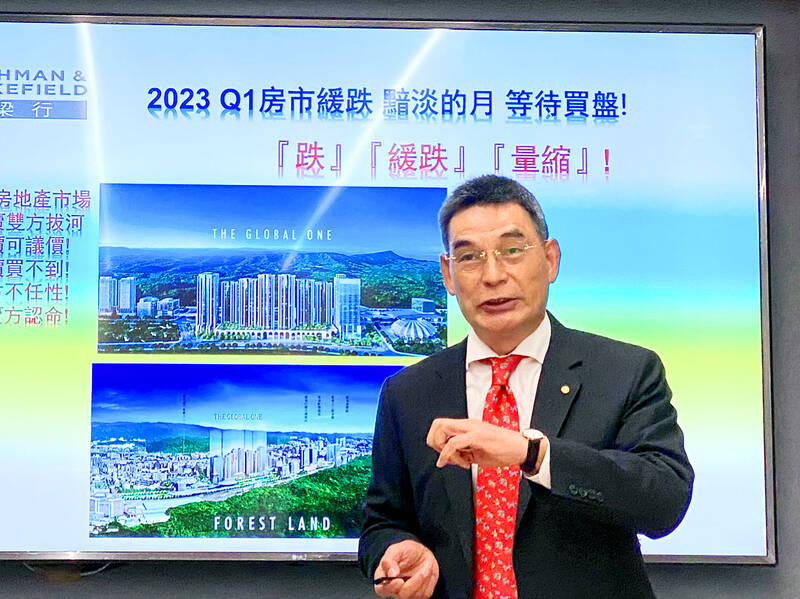Taiwan’s land, housing and hotel prices might need to fall 10 percent this year to spur buying interest, as an economic slowdown, monetary tightening and unfavorable legislation bode ill for transactions, Cushman & Wakefield Taiwan said yesterday.
“The property market is heading for a downturn in both transactions and prices, although some developers seek to push prices higher with their own capital,” Cushman & Wakefield Taiwan managing director Billy Yen (顏炳立) said.
The strategy would prove to be overreaching and impractical in light of a global economic slowdown and monetary tightening, Yen told a media briefing.

Photo: CNA
A liquidity-driven property boom plateaued in the first quarter of last year and has since lost steam, in line with interest rate hikes at home and abroad, he said, adding that the market cannot stay dynamic in the absence of sizeable capital injection.
Commercial property transactions shrank 17.6 percent year-on-year to NT$125.8 billion (US$4.1 billion) last year, while land deals plunged more than 40 percent to NT$171.8 billion, the property consultancy said.
Investment purposes drove 55 percent of commercial property transfers, the highest ratio in the past five years and outranking self-occupancy needs, it said.
Monetary tightening is dampening investment interest and bills that would ban transfers of presale housing contracts and subject unlisted companies to obtain regulatory approval before buying real estate could trigger panic selloffs and price corrections, Yen said.
Profits from property transactions on the part of companies are subject to income taxes of 20 percent, while individuals might pay up to 40 percent, depending on their income level. The gap has driven investors to set up companies to reduce taxes when trading real estate.
Yen said prices for commercial and residential properties would need to drop 10 percent to motivate potential buyers.
Hotels in popular locations have sought to increase their value through urban renewal, but properties in second-tier locations did not benefit and should display more pricing flexibility, Yen said.
Prices for storefronts would need to fall 20 percent to attract buyers, as physical stores are facing sharp competition from e-commerce firms, and rising operation and personnel costs, he said.
Yen said a 10 percent price correction would also apply to luxury housing units to motivate owners of multiple units to invest in them to hedge against inflation and investment risks.
“Players who do not have deep pockets better play safe in bad times,” Yen said.

Vincent Wei led fellow Singaporean farmers around an empty Malaysian plot, laying out plans for a greenhouse and rows of leafy vegetables. What he pitched was not just space for crops, but a lifeline for growers struggling to make ends meet in a city-state with high prices and little vacant land. The future agriculture hub is part of a joint special economic zone launched last year by the two neighbors, expected to cost US$123 million and produce 10,000 tonnes of fresh produce annually. It is attracting Singaporean farmers with promises of cheaper land, labor and energy just over the border.

US actor Matthew McConaughey has filed recordings of his image and voice with US patent authorities to protect them from unauthorized usage by artificial intelligence (AI) platforms, a representative said earlier this week. Several video clips and audio recordings were registered by the commercial arm of the Just Keep Livin’ Foundation, a non-profit created by the Oscar-winning actor and his wife, Camila, according to the US Patent and Trademark Office database. Many artists are increasingly concerned about the uncontrolled use of their image via generative AI since the rollout of ChatGPT and other AI-powered tools. Several US states have adopted

A proposed billionaires’ tax in California has ignited a political uproar in Silicon Valley, with tech titans threatening to leave the state while California Governor Gavin Newsom of the Democratic Party maneuvers to defeat a levy that he fears would lead to an exodus of wealth. A technology mecca, California has more billionaires than any other US state — a few hundred, by some estimates. About half its personal income tax revenue, a financial backbone in the nearly US$350 billion budget, comes from the top 1 percent of earners. A large healthcare union is attempting to place a proposal before

KEEPING UP: The acquisition of a cleanroom in Taiwan would enable Micron to increase production in a market where demand continues to outpace supply, a Micron official said Micron Technology Inc has signed a letter of intent to buy a fabrication site in Taiwan from Powerchip Semiconductor Manufacturing Corp (力積電) for US$1.8 billion to expand its production of memory chips. Micron would take control of the P5 site in Miaoli County’s Tongluo Township (銅鑼) and plans to ramp up DRAM production in phases after the transaction closes in the second quarter, the company said in a statement on Saturday. The acquisition includes an existing 12 inch fab cleanroom of 27,871m2 and would further position Micron to address growing global demand for memory solutions, the company said. Micron expects the transaction to